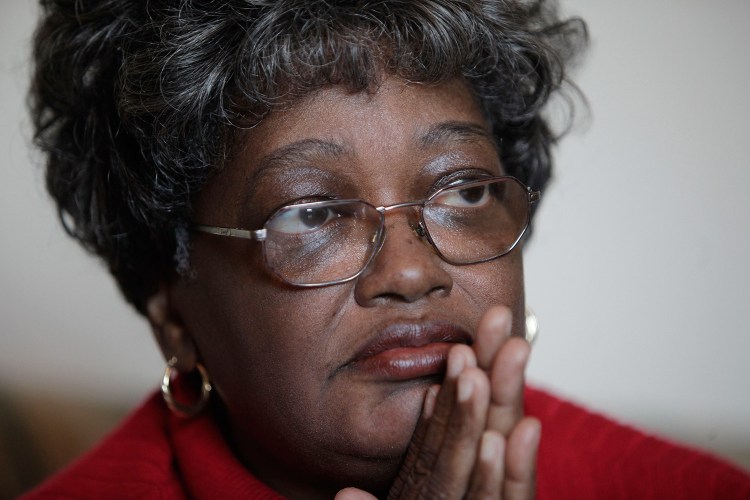On March 2, 1955, a young African-American woman boarded a city bus in Montgomery, Alabama, took her seat and, minutes later, refused the driver’s command to surrender it to a white passenger. “It felt like Harriet Tubman was pushing me down on one shoulder and Sojourner Truth was pushing me down on the other shoulder,” she mused years later. “History had me glued to the seat.”
Two police officers arrived, pulled her from her seat and forced her into a squad car; she prayed as they sped out. She was fingerprinted, denied a phone call and locked into a cell. Charged with disturbing the peace, breaking the bus segregation laws and assaulting the officers who had apprehended her, she was released later that night.
Although some of the details might seem familiar, this is not the Rosa Parks story. It is the story of Claudette Colvin, who was 15 when she waged her brave protest – nine months before Parks did – and has spent an eternity in Parks’ shadow. Now 76 and retired, Colvin deserves her place in history. As civil rights attorney Fred Gray put it, “Claudette gave all of us moral courage. If she had not done what she did, I am not sure that we would have been able to mount the support for Mrs. Parks.”
After her arrest and release to the custody of her pastor and great-aunt, Colvin insisted to everyone within earshot that she wanted to contest the charges. Her timing was superb. For months, Montgomery’s NAACP chapter had been looking for a court case to test the constitutionality of the bus laws. With funding from church donations and activities organized by the chapter, Colvin had her day in court. She was convicted on all charges, appealed and lost again.
The court declared her a ward of the state and remanded her to her family’s custody. All but housebound, mocked at school and “dropped,” as she put it, by Montgomery’s black leadership, Colvin saw her confidence plummet. That summer, she became pregnant by a much older man.
At the time, black leaders, including Martin Luther King Jr., had been seeking to stir the outrage of African Americans and sympathetic whites into civic action. Almost nine months after Colvin’s bus protest, she heard news reports that Parks, a 42-year-old seamstress, had likewise been arrested for a bus seating protest. “I was thinking, ‘Hey, I did that months ago,’ ” Colvin recalled. “I was glad that an adult had finally stood up to the system, but I felt left out.”
Parks’ protest helped spark the Montgomery bus boycott, which black leaders sought to supplement with a federal civil suit challenging the constitutionality of Montgomery’s bus laws. But attorney Gray found it all but impossible to find riders who would potentially risk their lives by attaching their names as plaintiffs. He went back to Colvin, now seven months pregnant. Assured that the hearing would not take place until after her baby was born, Colvin nervously assented to become one of four plaintiffs – not including Parks – in Browder v. Gayle.
The bright, opinionated Colvin’s feisty testimony was instrumental in the shocking success of the suit, which ended segregated seating on Montgomery’s buses. “I heard about the court decision on the news,” she recalled. “By then I didn’t have much time for celebrating anyway. I had been kicked out of school, and I had a 3-month-old baby.”
Unable to find work in Montgomery, Colvin moved to New York in 1958, while her son Raymond remained behind with family. She spent the next decade “going back and forth like a yo-yo between the two cities,” she said. After training, she landed a job as a nurse’s aide in a Catholic hospital in Manhattan.
The story of Colvin’s courage might have been forgotten forever had not Frank Sikora, a Birmingham newspaper reporter assigned in 1975 to write a retrospective of the bus boycott, remembered that there had been a girl arrested before Parks. Sikora called a startled Colvin and wrote an article about her.
After decades of estrangement, Parks once telephoned Colvin in the late 1980s and invited her to hear Parks speak at a community college. Colvin went to her job instead. “Rosa didn’t give me enough time to put in for a day off,” she recalled.
Colvin’s son Raymond died in 1993. A second son, Randy, born in 1960, gave her four grandchildren, who are all deeply proud of their grandmother’s heroism.
It is time for President Obama to award Colvin the Presidential Medal of Freedom, the nation’s highest civilian honor, to recognize her sacrifice and passionate dedication to social justice. She deserves our attention, our gratitude and a warm, bright spotlight all her own.
Send questions/comments to the editors.


